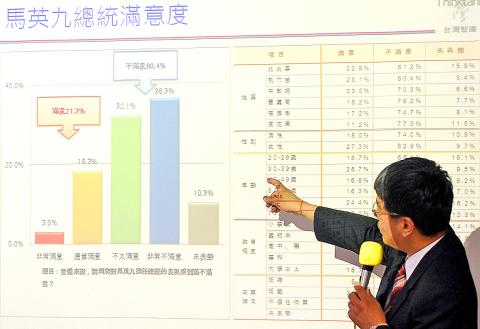On the eve of the final year of President Ma Ying-jeou’s (馬英九) second four-year term today, Ma’s disapproval rating stood at nearly 70 percent or higher in various surveys, while his approval rating was as low as less than 20 percent.
About 68.4 percent of respondents were dissatisfied with Ma’s performance as president, against 21.3 percent who said they were satisfied, in a telephone-based poll conducted on Sunday, Taiwan Thinktank said yesterday.
A cross-analysis of differences in political party affiliation found that among respondents who identified themselves as supporters of the pan-blue camp, 50.5 percent said they found Ma’s governance dissatisfactory, the poll showed.

Photo: Chen Chih-chu, Taipei Times
The survey found 49.1 percent of respondents doubted the image Ma has sought to establish as a clean politician because they said they believed there might have been some irregularities involving Ma in his handling of the Taipei Dome project when he was Taipei mayor, while 29.2 percent believed he was clean.
The president has repeatedly stressed that only by respecting the so-called “1992 consensus” — an alleged agreement between the Chinese Nationalist Party (KMT) and the Chinese Communist Party that there is “one China, with each side having its own interpretation of what ‘one China’” means” — can the “status quo” be maintained, but the survey found that a majority of people did not agree.
According to the survey, 68.7 percent of the public said they support maintaining the “status quo,” while only 15.4 percent said they support the “1992 consensus.”
KMT Chairman and New Taipei City Mayor Eric Chu’s (朱立倫) description of cross-strait relations as “both sides belonging to one China,” to which Ma has given his endorsement, was supported by only 13 percent of respondents, while 77.4 percent said Taiwan and China are both sovereign states, independent of each other and not subordinate to the other, the survey found.
About 50.2 percent of respondents said the government should place more consideration on the impact of cross-strait exchanges and negotiations on national security, while 38.1 percent said economic benefits should be the main concern, the poll showed.
On a scale of zero to 10, with zero indicating “not at all” and 10 signifying “extremely,” the extent to which respondents perceived Taiwan as depending on China to maintain its economic growth stood at 6.1. Moreover, 62.2 percent of respondents said Taiwan should deepen its economic ties with countries other than China.
A survey that the Chinese-language Liberty Times (the sister paper of the Taipei Times) conducted from Saturday to Monday found that 14.52 percent of respondents said they were satisfied with Ma’s performance over the past seven years, against 64.3 percent who thought the opposite.
Similar results were found in a survey released by the TVBS poll center yesterday showing Ma’s approval rating at 16 percent and disapproval rating at 67 percent.
In another poll, conducted by Taiwan Indicators Survey Research, 15.4 percent expressed satisfaction with Ma, while 75.7 percent were dissatisfied.
Additional reporting by Shih Hsiu-chuan

Tropical Storm Gaemi strengthened into a typhoon at 2pm yesterday, and could make landfall in Yilan County tomorrow, the Central Weather Administration (CWA) said yesterday. The agency was scheduled to issue a sea warning at 11:30pm yesterday, and could issue a land warning later today. Gaemi was moving north-northwest at 4kph, carrying maximum sustained winds near its center of up to 118.8kph and gusts of 154.8kph. The circumference is forecast to reach eastern Taiwan tomorrow morning, with the center making landfall in Yilan County later that night before departing from the north coast, CWA weather forecaster Kuan Shin-ping (官欣平) said yesterday. Uncertainty remains and

SEA WARNING LIKELY: The storm, named Gaemi, could become a moderate typhoon on Wednesday or Thursday, with the Taipei City Government preparing for flooding A tropical depression east of the Philippines developed into a tropical storm named Gaemi at 2pm yesterday, and was moving toward eastern Taiwan, the Central Weather Administration (CWA) said. Gaemi could begin to affect Taiwan proper on Tuesday, lasting until Friday, and could develop into a moderate typhoon on Wednesday or Thursday, it said. A sea warning for Gaemi could be issued as early as Tuesday morning, it added. Gaemi, the third tropical storm in the Pacific Ocean this typhoon season, is projected to begin moving northwest today, and be closest to Taiwan on Wednesday or Thursday, the agency said. Today, there would likely

DISRUPTIONS: The high-speed rail is to operate as normal, while several airlines either canceled flights or announced early departures or late arrivals Schools and offices in 15 cities and counties are to be closed today due to Typhoon Gaemi, local governments announced last night. The 15 are: Taipei, New Taipei City, Taoyuan, Tainan, Keelung, Hsinchu and Kaohsiung, as well as Yilan, Hualien, Hsinchu, Miaoli, Chiayi, Pingtung, Penghu and Lienchiang counties. People should brace for torrential rainfall brought by the storm, with its center forecast to make landfall on the east coast between tonight and tomorrow morning, the Central Weather Administration (CWA) said. The agency issued a sea warning for the typhoon at 11:30pm on Monday, followed by a land warning at 11:30am yesterday. As of

CASUALTY: A 70-year-old woman was killed by a falling tree in Kaohsiung as the premier warned all government agencies to remain on high alert for the next 24 hours Schools and offices nationwide are to be closed for a second day today as Typhoon Gaemi crosses over the nation, bringing torrential rain and whipping winds. Gaemi was forecast to make landfall late last night. From Tuesday night, its outer band brought substantial rainfall and strong winds to the nation. As of 6:15pm last night, the typhoon’s center was 20km southeast of Hualien County, Central Weather Administration (CWA) data showed. It was moving at 19kph and had a radius of 250km. As of 3pm yesterday, one woman had died, while 58 people were injured, the Central Emergency Operation Center said. The 70-year-old